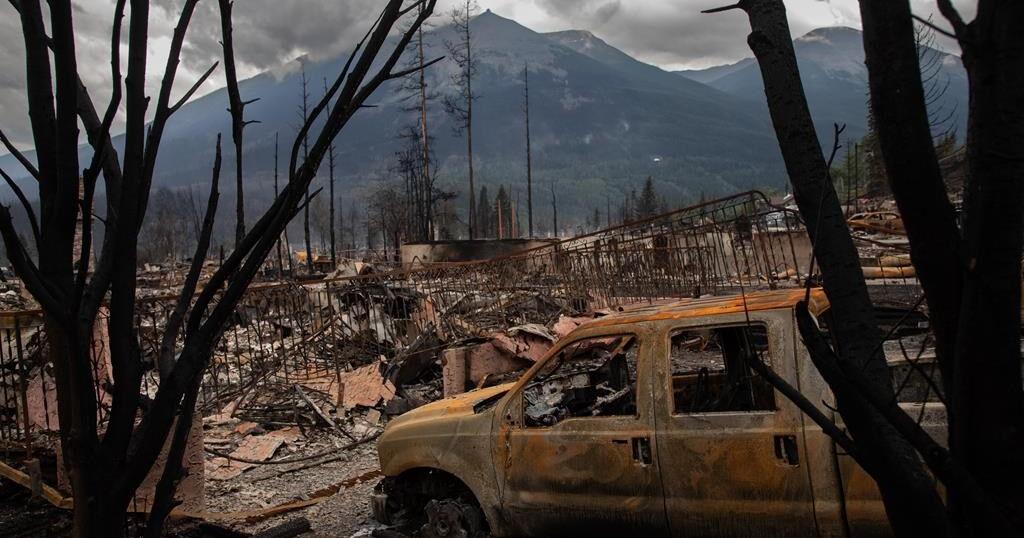Here is a roundup of stories from CanadaNewsMedia designed to bring you up to speed…
Residents set to return to Jasper townsite
Some residents of the Municipality of Jasper are set to return to the town today after a massive wildfire forced them out more than three weeks ago.
Jasper Mayor Richard Ireland has said only residents will be allowed to enter the town and other visitors will be directed to stay on the highway and drive on by.
The plan had been for a full reopening, but Ireland said this week plans changed after some residents said they were concerned about visitors intruding on their privacy as they learn first-hand the state of their homes and businesses.
The town’s 5,000 residents, along with 20,000 more visitors, were forced out on the night of July 22.
A massive wildfire entered the community about two days later and destroyed a third of its structures.
Here’s what else we’re watching…
CBSA to use new facial recognition app
The Canada Border Services Agency plans to implement an app that uses facial recognition technology to keep track of people who have been ordered to be deported from the country.
The mobile reporting app would use biometrics to confirm a person’s identity and record their location data when they use the app to check in. Documents obtained through access-to-information indicate that the CBSA has proposed such an app as far back as 2021.
A spokesperson confirmed that an app called ReportIn will be launched this fall.
Experts are flagging numerous concerns, questioning the validity of user consent and potential secrecy around how the technology makes its decisions.
Each year, about 2,000 people who have been ordered to leave the country fail to show up, meaning the CBSA “must spend considerable resources investigating, locating and in some cases detaining these clients,” says a 2021 document.
The agency pitched a smartphone app as an “ideal solution.”
Back to school puts Big Tech back in spotlight
Back to school could mean back to the hot seat for Big Tech.
Social media platforms TikTok, Facebook, Instagram and Snapchat spent last school year embroiled in a lawsuit accusing them of disrupting learning, contributing to a mental health crisis among youth and leaving teachers to manage the fallout.
When students return to class this September, experts say the clash between tech and textbooks will be reignited — and perhaps even ratcheted up — as schools and parents reckon with the impacts social media is having on education.
“Back to school is happening at a different time this year than was true two years ago, three years ago, four years ago,” said Richard Lachman, a digital media professor at Toronto Metropolitan University.
Brett Caraway, a professor of media economics at the University of Toronto, said the situation the education system finds itself in this year is a consequence of the proliferation of mobile devices that began in 2007 with the advent of the iPhone. It has been exacerbated by camera capabilities, apps and social networks.
Salt caverns could be key to green energy shift
Triple Point Resources Ltd. CEO Julie Lemieux wants people to understand the sheer size of the Fischell Salt Dome, a geological formation on Newfoundland’s west coast she says could play a key role in the green energy transition.
The dome is a thick mound or column of naturally occurring salt deposits, surrounded by layers of rock. If the salt is dissolved and the column is hollowed out and filled with hydrogen, Lemieux said, it could become one of the largest green energy storage facilities in eastern North America.
The company Lemieux leads, which is seeking to develop the Fischell site for hydrogen storage, is one of several Canadian companies that have turned their eyes to underground salt caverns as worldwide interest in greener sources of energy takes off.
The concept isn’t new — the petroleum industry has long used underground cavities for the safe storage of hydrocarbons. In Alberta, for example, more than 100 salt caverns have been in use as natural gas storage reservoirs for the past 50 years.
South of the border, the U.S. Strategic Petroleum Reserves holds emergency crude oil stocks in massive salt caverns located along the Gulf Coast.
Decision expected today in Jacob Hoggard appeal
Ontario’s top court is expected to deliver its ruling today in the case of Canadian musician Jacob Hoggard, who is challenging his sexual assault conviction.
Hoggard was found guilty in June 2022 of sexual assault causing bodily harm against an Ottawa woman, and later sentenced to five years behind bars.
He was released on bail hours later, pending his appeal.
Court documents show his lawyers appealed the conviction on four grounds, including that the trial judge erred by admitting the evidence of Lori Haskell, a clinical psychologist, on the neurobiology of trauma.
They also argued the trial judge wrongly permitted prosecutors to argue that the expert’s evidence supported the credibility of the woman Hoggard was found to have sexually assaulted.
This report by The Canadian Press was first published August 16, 2024.
























